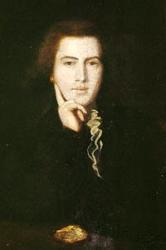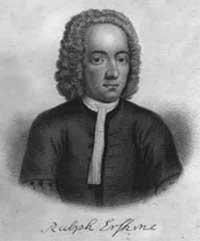? - 1785 Hymnal Number: 658 Author of "Great God, now condescend" in Hymns, Selected and Original, for Public and Private Worship Fellows, John. Date of birth unknown; d. 1785. He was the author of the following:—
(1) Grace Triumphant, a Sacred Poem in nine books, 1770; (2) Bromsgrove Elegy, in blank verse, on the Death of Rev. G. Whitefield, 1771; (3) An Elegy on the Death of Dr. Gill, 1771; (4) Hymns on Believers' Baptism, Birmingham, 1773; (5) The Apostle Paul's Defence before Felix, in verse, 1775; (6) Hymns in a great variety of Metres, on the Perfection of the Word of God and the Gospel of Jesus Christ, 1776; (7) The History of the Holy Bible, attempted in easy verse, 4 vols., 1777; (8) Six Instructive Views of Believers' Baptism, a tract published both separately and as an Introduction to the 2nd edition of his “Hymns on Believers' Baptism" 1777; (9) A Fair and Impartial Enquiry into the Rise, &c., of the Church of Rome, 1779; and also (10) "A Protestant Catechism."
Considering how numerous were the writings of J. Fellows, it is remarkable how little is known of him. It is stated by Dr. Joseph Belcher, in Historical Sketches of Hymns (Philadelphia, 1859), that he was a poor shoemaker, a member of the Baptist denomination, and that he lived in Birmingham. The evidence for this is tolerably clear.
That Fellows was a Baptist and not a Methodist, as Watt & Allibone say, is clear from his baptismal hymns. That be lived in or near Birmingham is likely from the fact that most of his books date from Birmingham, and are said to be printed for the author, though sold by G. Keith, Gracecburch Street, London. Also, to the 2nd edition of his Hymns on Believers' Baptism (1777) is prefixed a note of commendation, signed by eight Baptist ministers, who say they are personally acquainted with the author; and the first three names are those of the Baptist ministers at Birmingham, Coventry and Bromsgrove. From the records of the Baptist church formerly in Cannon Street, Birmingham, it appears that a John Fellows joined it early in 1780, and continued a member till his death on July 30, 1785. But one of J. Fellows's earlier pieces is entitled a Bromsgrove Elegy. Combining these facts we infer that Fellows first lived at Bromsgrove, and then, removing to Birmingham, joined the church in Cannon Street.
His hymns on Baptism are 55 in number. 6 are in Rippon's Selection, 1787. Some of his hymns are in all Baptist hymn-books, from Rippon to modern collections. These include the disputed "Humble souls who seek salvation", the hymn on behalf of children, "Great God, now condescend"; and others, all of which are annotated under their respective first lines. In addition the following are in limited use:—
1. Dear Lord, and will Thy pardoning love Embrace, &c. Adult Baptism. No. 28 of his Hymns on Believers' Baptism, 1773, in 7 stanzas of 4 lines, and headed "The Believer constrained by the love of Christ to fol¬low Him in His Ordinance." In Rippon's Selection, 1787, it was reduced to 4 stanzas: and in the Baptist Hymnal, 1879, to 6, stanza vi. being omitted. It is also sometimes given as "0 Lord, and will Thy pardoning love, &c."
2. Descend, Celestial Dove. Invocation of the Holy Spirit at Holy Baptism. No. 55 of his Hymns on Believers' Baptism, 1773, in 6 stanzas of 8 lines. In Rippon's Selection, 1787, these were rearranged in 4 stanzas, and again in the American Baptist Hymn & Tune Book, 1871, to 3 stanzas.
3. Go, teach the nations and baptize. Holy Baptism. No. 454, in Rippon's Selection, 1787, in 3 stanzas of 3 lines. It is given in a few American collections.
4. Great God, we in Thy courts appear. Holy Baptism. No. 43 in his Hymns on Believers' Baptism, 1773, and Rippon's Selection, 1787, No. 452, in 5 stanzas of 4 lines. It sometimes begins with stanza iii., "In Thy assembly here we stand."
5. Jesus, Mighty King of [in] Zion. Holy Baptism; Christ the Guide. No. 29 of his Hymns on Believers' Baptism, 1773, in 6 stanzas of 4 lines and headed, "Believers buried with Christ in Baptism." Rippon, 1787, reduced it to 3 stanzas, and these have been repeated in later collections as the American Baptist Hymn & Tune Book, 1871, &c. [Rev. W. R. Stevenson, M.A.]
--John Julian, Dictionary of Hymnology (1907)
John Fellows


 My Starred Hymns
My Starred Hymns




